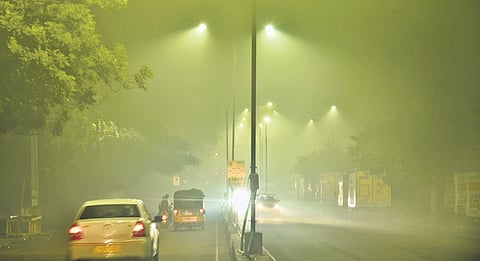

CHENNAI: Despite coordinated efforts by the Tamil Nadu Pollution Control Board (TNPCB), government restrictions on firecracker use, and extensive awareness campaigns, data collected across 39 locations in Tamil Nadu from October 24 to November 1 revealed significant pollution spikes across several districts. On Deepavali, Tamil Nadu’s air pollution levels presented a mixed picture, showing improvement in some areas while remaining critical in other areas, particularly in Chennai.
The TNPCB conducted both air quality and noise level monitoring as mandated by the Supreme Court. The directive, issued in 2018, requires pollution control boards to assess air and noise pollution during Deepavali to help curb festival-related environmental impact.
Data released by the TNPCB showed air quality in Chennai was ‘poor’ in four locations, while ‘moderate’ in three locations. The lowest was in Tiruvottiyur with Air Quality Index (AQI) of 150 and highest was recorded in Valasaravakkam with AQI of 287. Although, these readings showed improvement compared to 2023, when Valasaravakkam had recorded an AQI of 365, the air quality in the city still remained a concern.
This year, manual monitoring was done in 16 other districts including Coimbatore, Cuddalore, Madurai, Tirunelveli, Nagercoil, Thanjavur, Tiruchy, Vellore, Salem, Chengalpattu, Dindigul, Krishnagiri, Thoothukudi, Tiruppur, Nagapattinam and Kancheepuram.
According to the data recorded on the Central Control Room for Air Quality Management of Central Pollution Control Board (CPCB) website, the PM10 spiked to 130.72 ug/m3 on Friday in Thoothukudi, which is double the emission registered the previous day of 62.0 ug/m3. Meanwhile, noise levels ranged from a low of 59.8 dB(A) in Besant Nagar to a high of 78.7 dB(A) in Nungambakkam. In comparison, the highest noise level recorded in 2023 was 83.1 dB(A) in Sowcarpet.
Experts say the TNPCB data does not show the intraday spikes in problematic pollutants like PM2.5 and PM10. Manoj Kumar, analyst with Centre for Research on Energy and Clean Air analysed the hourly data, which shows PM2.5 peaked to 845 µg/m³in Perungudi.
All the Continuous Ambient Air Quality Stations (CAAQS) recorded severe pollution levels during several hours on the day of Deepavali.